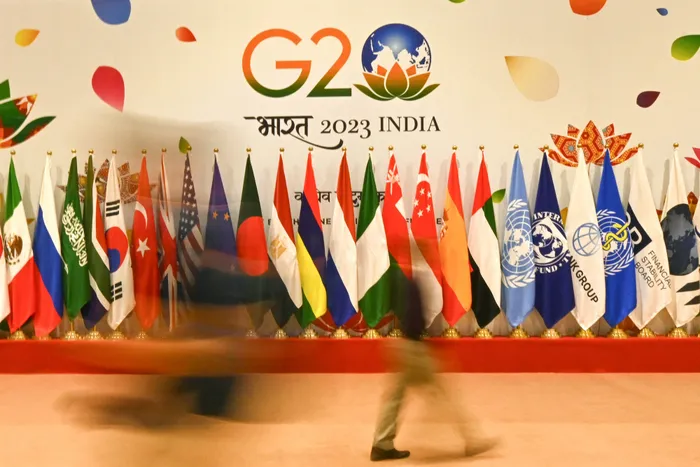18th G20 summit set to begin in New Delhi as faultlines among members widen

Picture: Money Sharma/AFP/Taken on September 7, 2023 – Flags of participating countries are pictured inside the International media centre at the G20 venue, days ahead of its commencement in New Delhi. The West’s disregard of concerns from the Global South on reforms of international financial institutions and climate change, as well as attempts to use the forum for geopolitical gains, has made consensus elusive, the writer says.
By Peoples Dispatch
The 18th G20 summit is set to open in the Indian capital New Delhi on Saturday, September 9. The two-day summit of the grouping would be the first to be held in India and is being keenly watched due to disagreements among member states on several economic and geopolitical issues.
The G20 consists of some of the world’s 20 largest economies, including 19 countries and the European Union (EU). Apart from the members, 11 more countries have been invited as guests, including Bangladesh, Egypt, Nigeria, and the UAE. The meeting will also be attended by representatives of different international organisations — from the UN to ASEAN.
While a number of heads of states are expected to attend the summit, including US President Joe Biden and British Prime Minister Rishi Sunak, Chinese President Xi Jinping and Russian President Vladimir Putin will not be participating. Russia will be represented by Foreign Minister Sergey Lavrov and China by Premier Li Qiang.
The grouping, which represents almost 80 percent of the world’s GDP and over two-thirds of the global population, was formed in 1999 as a platform for economic co-operation. It emerged as a significant forum for global economic co-ordination in 2008 as the West, represented by the G7 countries, found it useful in managing the impact of the global financial crisis at the time.
India, the current chair of the G20, has chosen “One Earth, One Family, One Future” or Vasudhaiva Kutumbakam as the theme for the summit.
India has been holding preparatory and technical meetings in the run-up to the summit for the last several months. Meetings of G20 Finance Deputies and Sherpas were conducted on September 6.
Growing disagreements over major agenda issues
The G20, which was pushed to prominence by the G7 countries — namely, the US, Japan, Germany, France, the UK, Italy, and South Korea — when they were unable to deal with the impact of the economic crisis, is gradually losing its significance due to their increasing emphasis on using the platform for geopolitical objectives.
In recent times, the potential of G20 as a grouping has further eroded due to the US attempts to re-establish the hegemony of the G7, increasing polarisation among the countries of the Global South over the West’s attempts to transfer responsibility to developing nations in areas such as climate change, and their refusal to reform multilateral forums and give up hegemonic control over multilateral financial and political institutions like the IMF, World Bank, and the UN.
It was very obvious during its last summit meeting in Bali, Indonesia, that some G20 members had different views from the West on issues such as global financial institutions, food and energy security, and climate change. Geopolitical issues, such as the war in Ukraine and the US-led New Cold War against China, have intensified these faultlines ever further.
According to the Indian government, the New Delhi summit has several major agenda items, including restructuring of international debt, increased disbursal of loans to developing countries, food and energy security, and regulation of cryptocurrencies.
Other important discussions would be around the issues of climate change and its financing, support for small and medium scale enterprises, labour rights, inclusive agricultural value chains, and bridging of global skill gaps.
India and some other countries are also pushing for full membership for the African Union in the Delhi summit.
US policies towards China have already created a rift in the grouping, with the Chinese terming it as “cold war mentality.” Other contentious issues are related to commitments to phase out of fossil fuels, reduction in greenhouse gas emissions, and renewable energy targets.
Countries such as Saudi Arabia and Russia, which are major exporters of fossil fuels, have objections to the hurried attempts to push for greater use of renewable energy, while countries like China have objected to any attempts at forceful emission reduction without considering historical and geopolitical factors.
President Xi Jinping had warned during the last summit in Indonesia about the “politicisation of food and energy issues” and the use of unilateral sanctions. He had also questioned rushed attempts to impose restrictions on the use of certain technologies and preferred use of certain energy resources, claiming that development and “modernisation is not a privilege reserved for any single country”.
The US is also insisting on a discussion on the economic impact of the war in Ukraine, which has created uncertainty about the possibility of a joint declaration at the end of the summit. While Indian Foreign Minister S Jaishankar has tried to play down this possibility, Lavrov has already warned that he will not agree with the final communique if Russian concerns over the war in Ukraine are ignored.
This article was first published on Peoples Dispatch